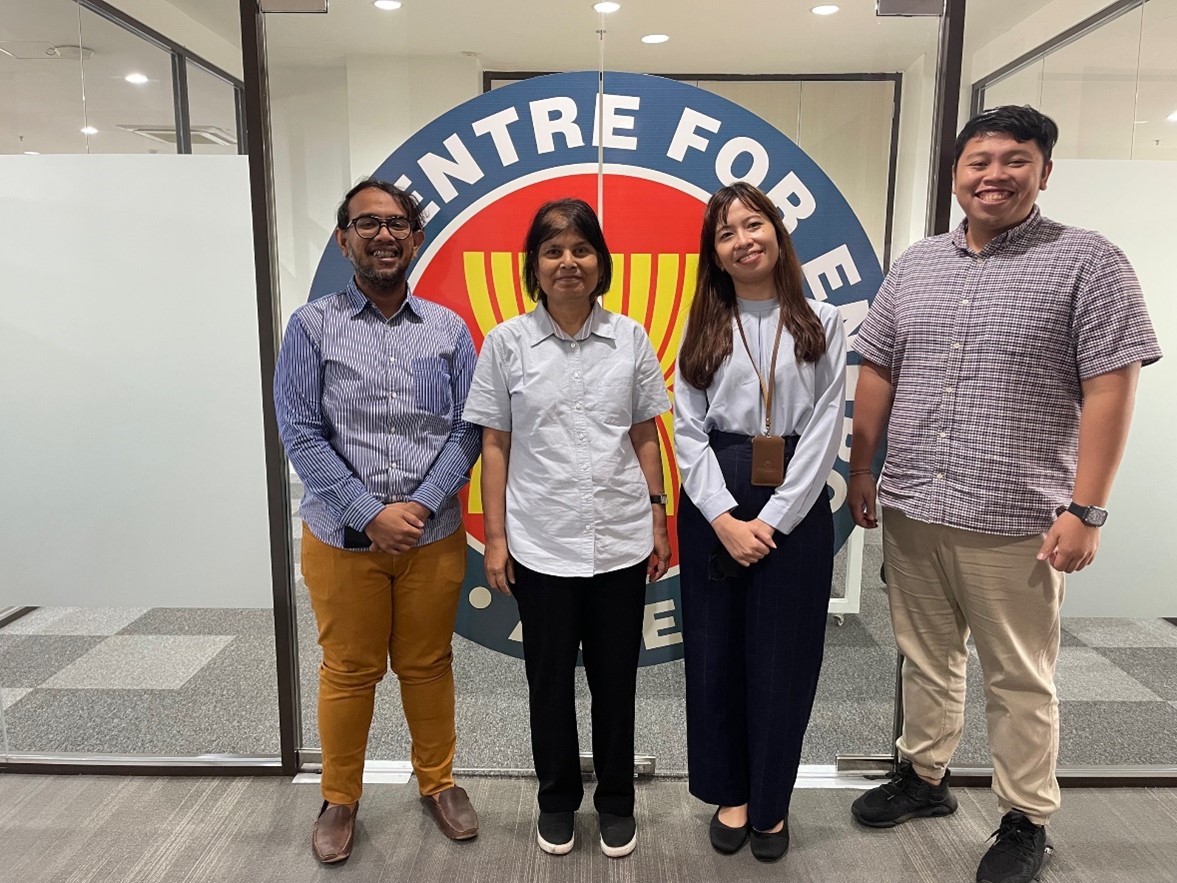i
i
Jakarta, 28 March 2023
Anjana Das, a representative of Integrated Research for Action Development (IRADe) met and discussed with ASEAN Climate Change and Energy Project Phase II (ACCEPT II) team, Aldilla Rakhiemah, Muhammad Shidiq, and Dewa Made Raditya at ACE (ASEAN Center for Energy) office on 28 March 2023 to share project activities among others and to seek potential collaboration between the parties.

IRADe representative and ACCEPT II representative during the discussion at ACE Office.
IRADe is a research institute based in New Delhi, India that among the research programs are on energy and power system, climate change and environment. Anjana Das who is senior expert consultant at IRADe had introduced the current IRADe’s activities such as net zero emissions pathways for the Indian power sector, green hydrogen value chain and its assessment the potential for Indian power sector as well as the work on modeling using MESSAGE. As a follow up, Anjana would like to share further information or publications once the studies have been accomplished.
Muhammad Shidiq who is senior researcher under ACCEPT II has also introduced about ACE and ACCEPT II activities. He mentioned that ACCEPT II is funded by Norwegian Government from 2022 – 2026 for phase II. The ACCEPT II is also working on net zero topics which cover activities including modeling, thematic studies, capacity building, etc. ACCEPT II is more than happy to open collaboration with any institution or organization including IRADe on how to explore potential collaboration between southeast Asia and south Asia.
During the discussion, the both parties have explored three activities which are grid connectivity and electricity trade, energy – climate modeling and hydrogen energy. On Grid connectivity and electricity, both parties have explored how south Asia and southeast Asia’s electricity grid could be connected and its impacts. South Asia has its own inner grid connectivity which integrates grid electricity among Afghanistan, Bangladesh, Bhutan, India, Nepal, and Pakistan. Meanwhile, southeast Asia has also regional grid connectivity such as Lao-Thailand-Malaysia-Singapore (LTMS). Each region has its own grid connectivity, and the interesting part is to understand the possibility and the impact on connecting the grids between the regions. Therefore, a collaborative work on the topic between ACE / ACCEPT II with IRADe could be proposed and collaborated. IRADe has implemented a 10-year project on South Asian Regional Energy Integration (SARI) funded by USAID. Under this project, IRADe has accomplished studies on India-Nepal-Bhutan-Bangladesh electricity trade. Another accomplished study is with UKAID under the Applied Research Programme on Energy and Economic Growth (EEG), on Implications of Declining Costs of Solar, Wind and Storage Technologies on Regional Power Trade in South Asia (BBIN Countries, Bangladesh, Bhutan, Nepal and India).
On energy – climate modeling, IRADe has expertise on the modeling using such as TIMES and MESSAGE. While ACE and ACCEPT II expertise on modeling is using LEAP. Both parties are working on modeling. During the discussion, the parties have seen as a potential collaboration between ACCEPT II and IRADe to work on modeling such as joint research and or joint capacity building. Currently, IRADe is working on a study to understand the India power plant transition to net zero where the study also uses TIMES to modeling net zero of the India power sector by 2050 and 2070. Lastly on hydrogen energy, the both parties have also explored the potential to have collaborative works on hydrogen energy between south Asia and southeast Asia. Both region are also considering hydrogen as future energy where joint research or capacity building on hydrogen between two regions would be interesting to be held.
Detailed information on ACCEPT II can be found at https://accept.aseanenergy.org/.
ACCEPT welcomes any collaboration, please feel free to contact us at [email protected]